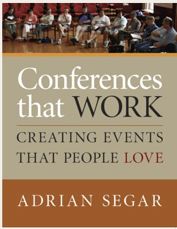
Adrian told me “I am on my fifth career” and that “the arch of my life makes sense.” What a wonderful thing – to have one’s life make sense.
He has been an academic, a physicist, an IT consultant, a conference developer, and now, a consultant to others searching for ways to make conferences work. His book “Conferences That Work” was published last year and is now gaining the recognition it deserves. Among others, he has been consulting with MGMA on the new “EDGE” program they are unveiling for 800 people in March 2011.
Adrian and I covered a range of topics and we discussed my dwindling interest in attending conferences for the past several years. He, too, had been disappointed in conferences – even those he organized – and was determined to find why traditional conference aren’t making the grade any more.
His book outlines four assumptions that traditional conference planners make:
Assumption #1. Conference session topics must be chosen and
scheduled in advance.
Assumption #2. Conference sessions are primarily for
transmitting pre-planned content.
Assumption #3. Supporting meaningful connections with other
attendees is not the conference organizers’ job; it’s something
that happens in the breaks between sessions.
Assumption #4. Conferences are best ended with some event that will hopefully convince attendees to stay to the end.
Adrian’s starting point was the current conference model of passive learning – letting others choose the topics and speakers and offering attendees limited opportunities for anything besides pre-determined content. He moved from the model of passive learning to peer learning – leveraging the power and knowledge of the attendees to harness the hot topics of THAT MOMENT, not the moment that the conference committee met to determine the educational content 12 months or even 6 months ago. He noted that the best conference committees are able to guess less than 50% of what attendees really want from a conference.
Adrian uses the example of social media to illustrate the difference between broadcasting information (old) and partnering to share information (new), and notes that the goal of Conferences That Work is to “bring the resources of all attendees to each attendee.” I’ve been to a one-day meeting that accomplished that goal and I left the “camp” feeling energized, overrun with ideas and already connected through Twitter with almost everyone at the well-attended program. It was amazing.
If you are developing meetings or conferences for your church, your charity, your local or state managers group or for any other type of group, or if you want to see the future of conferences, you owe it to yourself to read “Conferences That Work” by Adrian Segar. He’s on a mission and he’s going to design and rock a conference that you, if you’re lucky, will attend some day soon.
Excerpts from his book are available here.
Free downloads to assist in making conferences that work are here.
His blog is excellent and can be found here.


